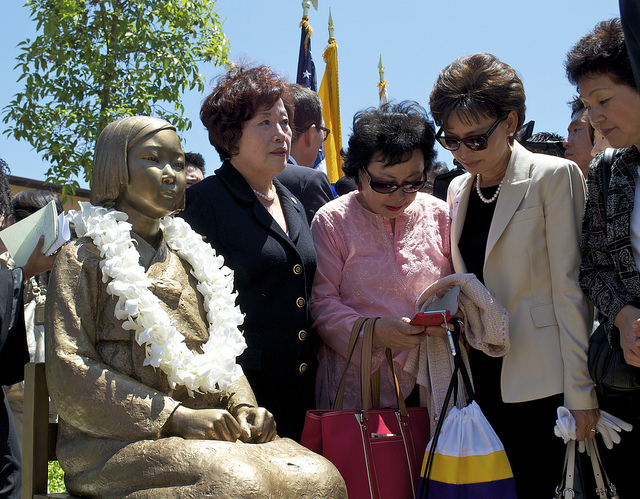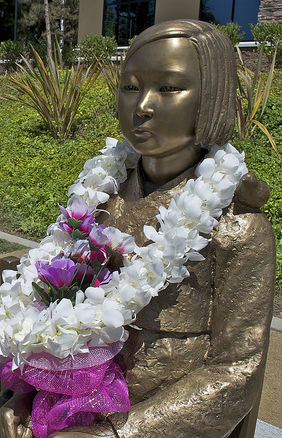Korean 'Comfort Women' Still Protesting Decades Later
/Olivia Elswick, Asia CorrespondentLast Modified: 12:36 p.m. DST, 25 June 2014
SEOUL, South Korea -- Elderly Korean women (euphemistically referred to as “comfort women”) who were forced into prostitution as teenagers during WWII, have gathered every Wednesday since 8 January, 1992, outside the Japanese embassy in Seoul to protest the atrocities they faced. These demonstrations are now lauded by guidebooks and travel websites as a must-see for tourists to Seoul.
Though groups of Japanese tourists come to apologize to these determined women, the Japanese government has refused to apologize. The women are hoping the Japanese government will issue an official apology and provide reparations to those forced into sexual slavery. Japan’s response is that this compensation was settled with the 1994 “Asian Women’s Fund.” South Korea rejected the fund because it is a semi-private organization run by volunteers, and not under the authority of the government.
In 2007 the U.S. House of Representatives, passed a non-binding resolution that called on Japan to apologize for forcing these women into prostitution. In April, President Obama called on Japan to acknowledge their past wrong-doings, saying, "This was a terrible, egregious violation of human rights. Those women were violated in ways that, even in the midst of war, were shocking.” Obama also called on Seoul to look to the future and be more flexible in its relations with Japan to ensure better cooperation between the two countries.
Japan responded that the issue of wartime sex slavery is not a political or diplomatic subject. The issue is a hindrance to Tokyo’s relations with East Asia, and South Korea in particular.
Despite their dwindling numbers, with fewer than 100 Korean comfort women still alive, one survivor, Hwang Geum-joo says, ”Our numbers are dwindling every year, but we are still full of anger and they should apologize for what they did to us!” Around 200,000 women, mainly from Korea, but also from China, Taiwan, and Indonesia, were forced into brothels to serve Japanese imperial troops. Many were abducted from their homes or duped into forced prostitution after responding to calls to work as nurses and factory workers. Japanese Prime Minister Shinzo Abe, and other members of the political right continue to doubt these women, instead, claiming professional prostitutes staffed the brothels.
Monday, June 23, 2014, South Korea protested an appearance by Japan’s ambassador, condemning Tokyo’s review of a noteworthy 1993 apology for the wartime sex slavery. The review made the claim that there was no evidence to confirm the forced sexual misconduct.
China’s Foreign Ministry spokeswoman Hua Chunying is also urging Japan to address the problematic history of sexual exploitation. Japan invaded China in 1937 and held an authoritarian rule for eight years.
In 2011 on the occasion of the 1,000th demonstration, the organizers erected the Pyeonghwa-bu Peace Monument, a statue of a barefooted-teenage Korean girl, with her hands in her lap, and a small bird on her left shoulder representing peace and freedom. The women offer monthly tours of the 'House of Sharing,' a benefit center for survivors of Japanese sex slavery, where many of the ladies now live.
Follow Olivia on Twitter Twitter: @nahmias_report Asia Correspondent: @OCELswick
Related articles
Seeking Justice - Or at Least the Truth - for "Comfort Women" (fpif.org)
One more victim of Japan's wartime sex slavery dies (koreaherald.com)
No Japanese government apology for 'comfort women' forced prostitution (dearkitty1.wordpress.com)
Tension rises as Japan set to unveil review of 1993 apology (koreaherald.com)
Seoul's PM-designate in WW2 apology (bbc.co.uk)












 AFRICA - The practice of female genital mutilation entails the partial or total cutting away of external female genitalia. Traditional healers, birth attendants, or elderly woman usually carry out the procedure, usually in septic environments.
AFRICA - The practice of female genital mutilation entails the partial or total cutting away of external female genitalia. Traditional healers, birth attendants, or elderly woman usually carry out the procedure, usually in septic environments.










